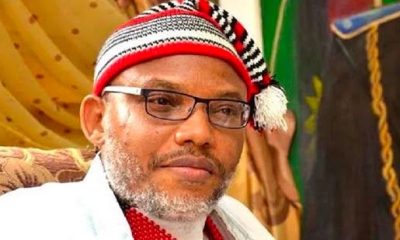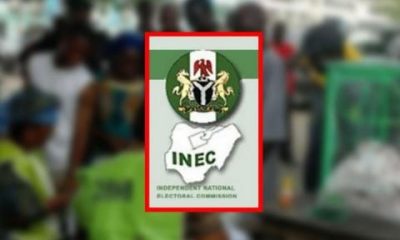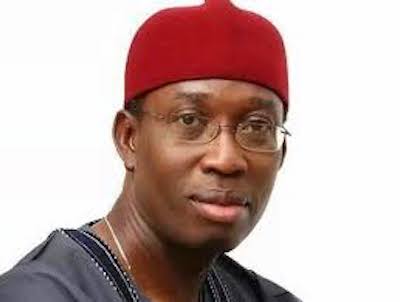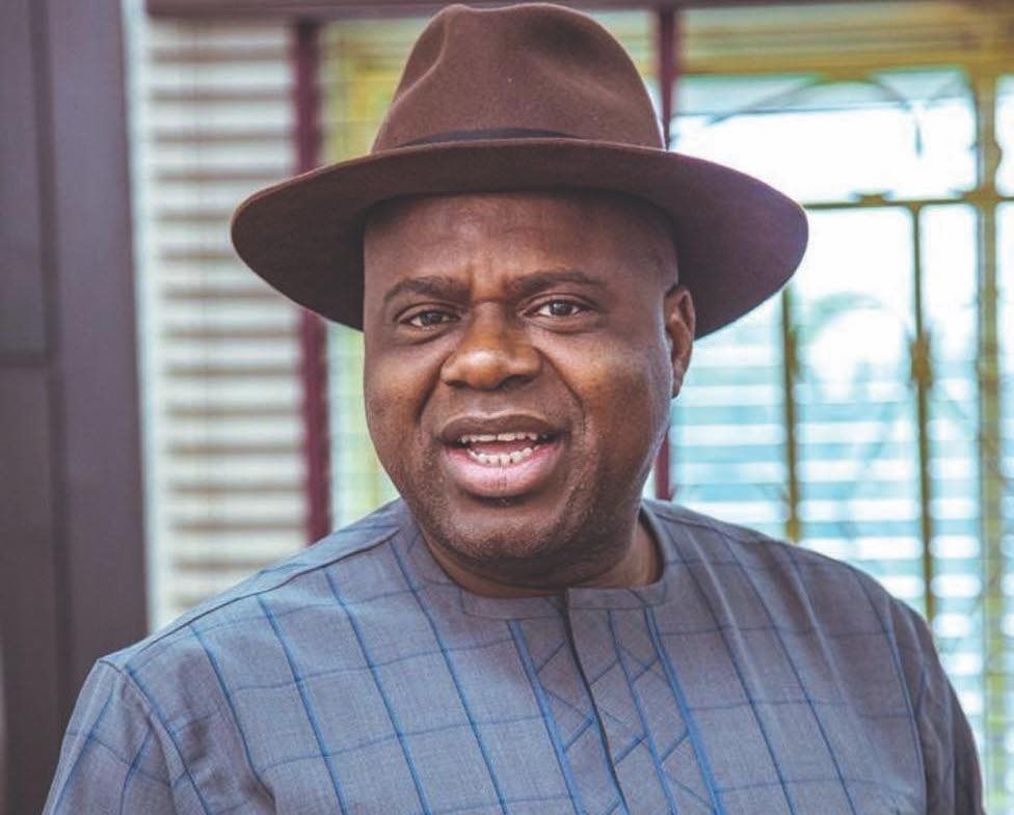OPINION
The Trouble with IPOB’s Sit-at-home Orders
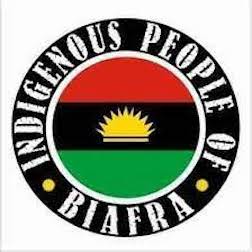
By Rudolf Ogoo Okonkwo
In all of his 69 to 79 years in this world, how many times has Bola Tinubu, the man who could be the next president of Nigeria, visited the South-East?
I guess that it may not be up to a dozen times. He didn’t go there to school, compete in debates, quiz or Koran recital challenges.
He surely didn’t go there on a school excursion to visit a major dam or a game reserve. Who wants to cross the Niger River just to visit Ogbunike Cave, Ngwo Pine Forest or Oguta Lake? The Umuahia Biafra War museum was not yet built when he went to school. We know that he did not go to the South-East to work after school. With Ndubisi Kanu, Ebitu Ukiwe, Anya O. Anya, Ralph Obioha and others in the National Democratic Coalition (NADECO), Tinubu most definitely did not go to the South-East to solicit support for MKO Abiola’s mandate during the pro-democracy movement of the 90s. When he emerged and became the governor of Lagos State, he had no need to campaign in the South-East. The same as when he became a National Leader of the All Progressves Congress (APC).Why are all these important? What have they got to do with the sit-at-home order introduced in the South-East by the Indigenous People of Biafra (IPOB) to add pressure to their quest for the actualisation of an independent nation of Biafra?
I will get to these in a short while. In the meantime, follow me on this little detour.
While the opinion of Boko Haram members is not seen as the opinion of the people of the North-East of Nigeria, the same is not true of the opinion of Biafrans. Outside of the South-East, the opinion of Biafrans is by default considered the universal opinion of the people of the South-East. If you are from the South-East, many still see you as a Biafran, irrespective of how many times you swear not to be allied to the Biafrans.
We know why it is that way. It is because the people of the South-East are the most misunderstood people of Nigeria. The Fulanis come a close second. The misunderstanding is so endemic that the people of the South-East are beginning to misunderstand themselves as a result. I am sure psychologists must have a name for this syndrome.
The reason for the misunderstanding is clear. Even though all categories of South-Eastern people live all over Nigeria, speak various languages of the places they live in, the same is not true about other people from other parts of Nigeria within the South-East. Take out the National Youth Service Corps programme that compels many young educated and adventurous people to spend a year in the South-East, most Nigerians would not have any reason ever to visit the South-East.
There is little or no federal presence in the region to bring diverse workers from across the country to the South-East. The other reason, related to the first, is that life is very hard in the South-East. It is hard for the people in that region, so they leave at the slightest opportunity. If it is tough for the indigenes to stay and make a living there, what hope does it offer non-indigenes?
Unfortunately, there is no way of understanding people you have not interacted with, in their natural environment.
It is important to understand this distinction, if one wants to understand in their proper context, events taking place in the South-East and put them in their proper framework. This is vital for people who are not from the region but more cogent for people from the region but who are ignorant of the dynamics of Nigeria and how they impact the perspectives of others and the perception they have of themselves.
When IPOB first introduced the sit-at-home order, the idea was to show that most people in the South-East support their quest for an independent nation of Biafra. It started as a once-a-year event, partly to remember those who died in the Nigeria-Biafra War. In the beginning, so many people in the region did not mind sacrificing a day to remember the dead. It soon transformed into a tool for achieving other goals, including the raising of awareness for other Biafran-related issues. Of recent, it has become a tool to draw attention to the plight of the leader of IPOB, Nnamdi Kanu.
As such things are known to transform, the sit-at-home has become so frequent that it has triggered a backlash and a diminishing return. With resistance to the order has come fierce enforcement with the force of arms. The people who initiated it have also lost control, that they cannot pull it back. Freelance actors, breakaway factions, and others outside the original IPOB, have seen the tool as one to use to exert control over the populace. They and their supporters argue that despite the groaning of the region’s people, it is worth the sacrifice. They often quote unrelated and unsymmetrical history to support their arguments.
For 27 years that Nelson Mandela was in prison, if black South Africans had stayed at home one day of every week, they would have spent 1,458 days at home, which would have been four years of their lives. If you think that South African blacks are poor now, imagine how poorer they would have been if they had lost four years of income. And under Apartheid, the white business-owners would have fired most of them from their jobs for such action.
While sacrifice has a place in every struggle, it must be well-crafted and one with the buy-in of a majority of the people. Otherwise, those imposing the sacrifice are essentially saying that the people they are fighting for are idiots, who have no minds of their own.
Also, responsible people have compared the frequent and economically strangulating sit-at-home orders as akin to drinking poison and hoping that your enemy would die or sitting at home crushing your testicles and wondering why you cannot get your wife pregnant. The idea that President Buhari would release Nnamdi Kanu because Igbo people are forcing themselves to stay at home does not sound like a strategy coming from those who have a good understanding of how Nigeria works, especially when it relates to anything tangential to Biafra.
If the sit-at-home were voluntary and sparingly used, it would have bestowed credibility on the argument of the general acceptance of the Biafran goals. All it required was to keep winning hearts and souls, as more and more people joined the action. But our people have no such patience. They want it now – nzogbu-nzogbu. Using the threat of bodily harm to enforce the sit-at-home order, you lose the moral right to argue that it is a referendum by another name.
A true voluntary sit-at-home would not need force to get people to comply. And Igbo people outside Igbo land will voluntarily join in staying at home. By not joining, they are giving it the thumbs down. They enjoy the freedom and the advantage that they deny folks at home. They are endorsing a philosophy that they are better and superior to those at home. That is a recipe for resentment, which can only lead to discord and disaster in a struggle like this.
More dangerously, by imposing economic hardship on the home front, we encourage more people to leave home. That is the inverse of what the new Igbo awareness should be – which is a return home to rebuild – aku lue ulo.
There is a reason Buhari won’t care if all the markets in the South-East are closed for the next 27 years. It is the same reason that Bola Tinubu will not care if school children in the South-East are never allowed to seat for WAEC again, if pregnant women have babies on banana leaves at home and children dig graves to bury their dead parents themselves.
We can be sentimental for the mundane, but history is not sentimental, not even for the profane. We can sit at home as much as we like, but we cannot sit on history. Our forefathers said that the wise ones get the proverb while the stubborn ones bury their heads inside the bush.
The limit of sit-at-home comes when it begins to crush a man’s testicles.
Rudolf Ogoo Okonkwo teaches Post-Colonial African History at the School of Visual Arts in New York City. He is also the host of Dr. Damages Show. His books include This American Life Sef, Children of a Retired God, among others.
OPINION
Tinubunomics: Stabilisation First, Growth Must Follow

Why Okonjo-Iweala Was Right
Dr. Ngozi Okonjo-Iweala’s statement that President Tinubu deserves credit for stabilising the economy is not just diplomatic—it’s analytically sound. Stability is the prerequisite for any meaningful reform. Without it, growth is impossible.
But unfortunately, many Nigerians appear to have misread Mrs. Okonjo-Iweala, leading to misguided backlash. Let us break down the reality using the analogy of doctors in an emergency unit of a hospital:Economic triage analogy: Nigeria was haemorrhaging from reckless monetary expansion, subsidy fraud, and forex arbitrage. Tinubu’s early actions—removing fuel subsidy, halting money printing, and unifying forex markets—were akin to emergency surgery to stabilise patient Nigeria.
Inflation containment: Inflation, while still high, has stopped its dangerous upward spiral. July 2025 figures show a cooling to 21.88%. This is stability.
Forex rationalisation: The naira now trades within a stable band (N1,500–N1,600), eliminating arbitrage opportunities that previously drained public funds.
This is stability.
But Stabilisation Is Not a Cure
Stability is the floor, not the ceiling. Without growth and social cushioning, patient Nigeria risks slipping into economic coma. Let us put two of the flagship policies of Tinubunomics under the X-ray
Fuel subsidy removal: While it stopped treasury looting, it hasn’t yet catalysed domestic refining.
NNPCL refineries remain idle, and Dangote’s monopoly lacks pricing pressure.
Forex unification: It ended arbitrage but made imports prohibitively expensive.
No clear import substitution strategy has followed.
Growth Requires Sectoral Activation
Mrs. Iweala’s call for growth and safety nets is a roadmap. Here’s what’s needed
Sector Reform Needed
Agriculture – Security for farmers, mechanisation, irrigation
Industry – Power supply, tax reform, infrastructure
Energy & Power – Attract private sector operatorship of TCN for grid upgrades and modernisation, unbundle the DISCOs and re-award licences to more competent operators. Boost crude oil production: The US has 50 billion bbls in reserves and producing 13 million bbls per day. Nigeria has 38 billion bbls in reserves but producing less than 2 million bbls.
Infrastructure – Roads, rail, broadband. 35 states are still not connected to the federal capital by rail.
Digital Economy – Rural connectivity, start-up support
Health & Education – Primary care, public health, hospital infrastructure, healthcare workers’ welfare, school infrastructure, teachers’ welfare.
Fiscal Capacity and Private Sector Involvement
Given a federal budget of approximately $35 billion, Nigeria’s fiscal space is severely constrained. This allocation must cover a wide array of obligations—from debt servicing and recurrent expenditure to essential public services—leaving limited room for strategic investment in growth-driving sectors such as infrastructure, manufacturing, and innovation.To bridge this gap, the active participation of the private sector is not optional—it is imperative. Unlocking private capital, fostering public-private partnerships, and creating a predictable investment climate are critical to achieving sustainable development and inclusive economic expansion. The government must focus on enabling policies, while the private sector drives execution and scale.
Conclusion: Stabilisation Is Not Success.
Tinubu’s reforms have stopped the bleeding. But healing requires sustained treatment—growth, jobs, and protection for the vulnerable – which must come with speed! Okonjo-Iweala’s assessment is not just correct; it’s a call to action.
Nick Agule is a Nigerian citizen and public affairs analyst passionate about the development of Nigeria.
Email: nick.agule@yahoo.co.uk
X: Nick Agule, FCA
Facebook: Nick Agule, FCA
OPINION
President Bola Tinubu: Establish a National Bureau for Ethnic Relations and Inter Group Unity

By Wilfred Uji
I once wrote an article based on a thorough research that all the states of North Central of Nigeria, Kwara, Niger, Kogi, Benue, Plateau and Nasarawa States, share a great deal of historical relations, resources, ethnicity and intergroup relations. These states have a common shared boarders with common security challenges that can only be effectively managed and resolved from a regional perspective and framework.
The exercise at the creation of states have overtime drawn arbitrary boundaries which in contemporary times are critical security and developmental issues that affects the sub region.
Firstly is the knowledge and teaching of history that can help grow and promote a regional unity and intergroup relations.
As far back as the pre-colonial era, the North Central of Nigeria had a plethora of multi ethnic groups which co-existed within the framework of mutual dependence exploiting indigenous peace initiatives. The diverse ethnic groups comprising of Nupe, Gwari, Gbagi, Eggon, Igala, Idoma, Jukun, Alago, Tiv, Gwanadara, Birom, Tarok, Angas, etc were independent state sovereignties before the advent of British colonial rule by the first quarter of the twentieth century.
Secoundly that British colonialism for economic and political exigencies almagamated all these ethnic groups under the Northern Region with headquarters first at Lokoja and later moved to Kaduna.
The indirect rule policy placed all the traditional political chiefdoms of the sub region under the political supervision, for the convience of taxation and draft labor, under the Sokoto Caliphate.
The indirect rule political structure was not intended to be a game changer that would enforce the dominance and hegemony of the Sokoto Caliphate over the people, land and resources of the sub region.
Thirdly, in the realization of the above, the British colonial state first created the Munchi Province and later the Benue Province as a political and state framework that could accommodate all the ethnic diversity of some of the North Central people.
State creation which ought to allow room for minority representation and expression, over time, has been turned upside down, by some ethnic groups as a vehicle of the exclusion of some minority groups.
For instance, the creation of Benue State in 1976 and Nasarawa State in 1996, does not signify and imply the exclusion of the Tiv and Idoma from Nasarawa State as well as the exclusion of the Alago and Jukun from Benue State.
These ethnic groups, long before state creation, had indigenous roots in all the states of the North Central of Nigeria. Historically, it is misleading and erroneous for these ethnic nationalities to be regarded as tenant settlers in the states where they are located.
The term tenant settlers have been used by the ruling political class of some states of the North Central of Nigeria as a staging point for land grabbing, genocide, land claims and struggles that has created a night mare for the security landscape of the region. In contemporary times, there is no denying the fact that there is an ethnic question in the North Central of Nigeria where there has been a revival of ethnic nationalism by some irredentist groups reinforced by revisionist historians. The ethnic nationalism which on one hand is a cultural revival but on the other promotes a hate agenda, is dangerous and antithetical to the inter group relations and unity of the North Central of Nigeria.
Ethnic hate, the idea that some ethnic nationalities do not belong or have indigenous roots in a state, has been responsible for some of the modern genocide and massacre in the history of modern Nigeria.
For political and security reasons, there is scanty research in this regard, the study of modern genocide backed by state action. Or where such research exist, it is often play down and watered as inter group conflicts and violent hostilities that should be treated with kids gloves and palliatives. This liberal and pessimistic approach to conflict management has been a responsible factor in the decimal reoccurrence of violent ethnic conflicts of the North Central States. The Liberal approach to conflict management, looks at the symptoms instead of the treatment of the disease.
Ethnocentrism is both an African and Nigerian reality that over time and space has been fueled and exploited by the ruling political class and elites. It is one of critical challenge of nation building in Africa that appears to be a curse of a continent and people.
All nations of the world have their share of the nightmare of ethnic and racial bigotry at one point or the other in their national history and transformation.
In the United States of America, it was dubbed the race question in the post emancipation era, the politics of the color line as William Dubios described the racial tension and phenomenon of his prevailing age and society. The race question sparked many reactions including the establishment of societies and organizations for the protection of the African American as well as the defence of the fundamental civil rights of the “American Negro”.
One of such initiative adopted by the State in America which was aimed at the improvement of the welfare and wellbeing of the African American as as his integration into main stream society was the establishment of the Bureau For Freed Men on race relations. The Bureau as a Federal institution was designed for the reconciliation of the inequality and segregation of the African American inorder for him to access equitable development and national resources, but, more importantly, political representation at both state and national level.
Subsequently, the Bureau came up with a number of proactive programmes and policies including the Affirmative Action as well as Federal Character Quota Systems that ensured the equitable and just integration of African Americans in main stream society and politics.
In recent years, Nigeria has established some regional frameworks that can translate into the creation of a Bureau for Ethnic Relations. One of such regional framework is the establishment of the North Central Development Commission by President Bola Ahmed Tinubu.
The Development Commission if strategically placed and positioned, can create a Bureau For Ethnic Relations that will help promote and reconcile inter-ethnic relations and development within the North Central of Nigeria.
I am limited as to the mandate of the commission interms development and the transformation of the North Central of Nigeria.
If the commission suffers from a deficit to manage ethnic relations along the lines of affirmative action and federal character principle, then, the federal government should as a matter of social priority establish an Bureau For Ethnic Relations of the six geopolitical units of Nigeria.
Let me end this write up by using the words of William Dubios that the challenge of Nigeria in the twenty first century is that of ethnic relations, it is that of the ethnic content, that of fairer skin races to that of the dark skin races.
Prof. Uji Wilfred is from the Department of History and International Studies, Federal University of Lafia
Education
Varsity Don Advocates Establishment of National Bureau for Ethnic Relations, Inter-Group Unity

By David Torough, Abuja
A university scholar, Prof. Uji Wilfred of the Department of History and International Studies, Federal University of Lafia, has called on the Federal Government to establish a National Bureau for Ethnic Relations to strengthen inter-group unity and address the deep-seated ethnic tensions in Nigeria, particularly in the North Central region.
Prof.
Wilfred, in a paper drawing from years of research, argued that the six states of the North Central—Kwara, Niger, Kogi, Benue, Plateau, and Nasarawa share long-standing historical, cultural, and economic ties that have been eroded by arbitrary state boundaries and ethnic politics.According to him, pre-colonial North Central Nigeria was home to a rich mix of ethnic groups—including Nupe, Gwari, Gbagi, Eggon, Igala, Idoma, Jukun, Alago, Tiv, Birom, Tarok, Angas, among others, who coexisted through indigenous peace mechanisms.
These communities, he noted, were amalgamated by British colonial authorities under the Northern Region, first headquartered in Lokoja before being moved to Kaduna.
He stressed that state creation, which was intended to promote minority inclusion, has in some cases fueled exclusionary politics and ethnic tensions. “It is historically misleading,” Wilfred stated, “to regard certain ethnic nationalities as mere tenant settlers in states where they have deep indigenous roots.”
The don warned that such narratives have been exploited by political elites for land grabbing, ethnic cleansing, and violent conflicts, undermining security in the sub-region.
He likened Nigeria’s ethnic question to America’s historic “race question” and urged the adoption of structures similar to the Freedmen’s Bureau, which addressed racial inequality in post-emancipation America through affirmative action and equitable representation.
Wilfred acknowledged the recent creation of the North Central Development Commission by President Bola Tinubu as a step in the right direction, but said its mandate may not be sufficient to address ethnic relations.
He urged the federal government to either expand the commission’s role or create a dedicated Bureau for Ethnic Relations in all six geo-political zones to foster reconciliation, equality, and sustainable development.
Quoting African-American scholar W.E.B. Du Bois, Prof. Wilfred concluded that the challenge of Nigeria in the 21st century is fundamentally one of ethnic relations, which must be addressed with deliberate policies for unity and integration.



